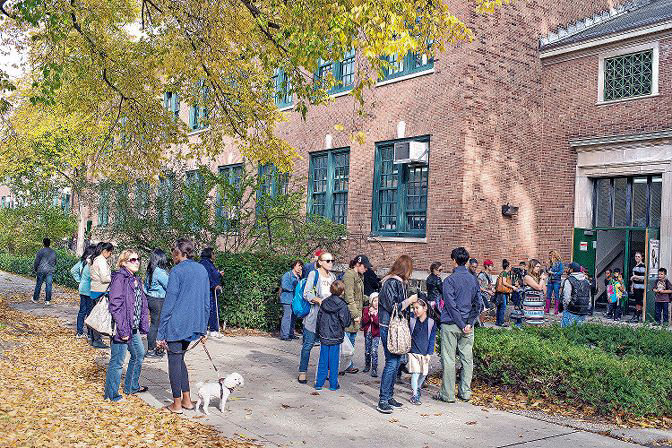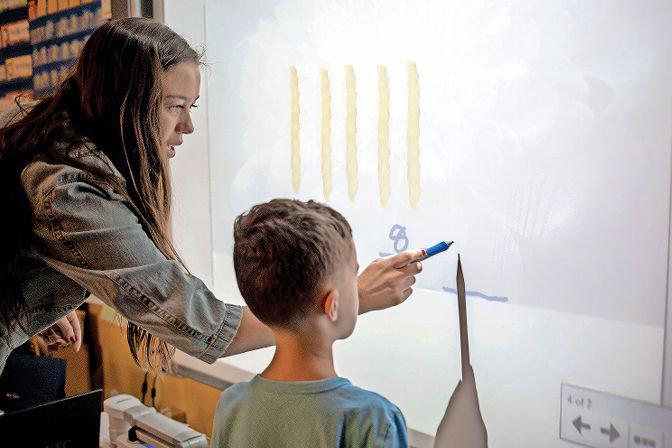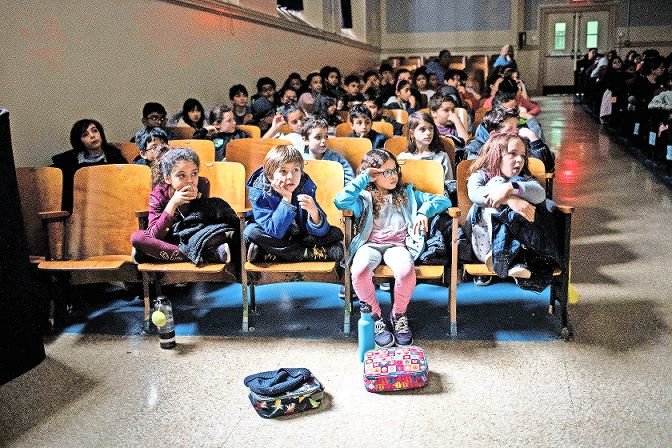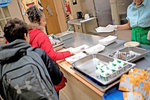School nurses ‘essential’ now more than ever before
Cuts, scrapes and bruises are common injuries among children. And when they happen at school, more often than not, there’s a nurse nearby to patch them up and send them back to class.
But when campuses reopen later this month, school nurses might be doing much more than doling out bandages and ice packs.
During the height of the coronavirus pandemic, nurses were synonymous with the term “essential workers.” And even with New York’s infection rates at lows not seen since the start of the public health crisis, these nurses become just as essential to the overall reopening process — to the point where Mayor Bill de Blasio has promised each public school will come complete with a full-time nurse on staff.
de Blasio made the commitment just last month, but the idea was floated as early as July when city comptroller Scott Stringer released a report detailing measures he believed schools should take if they wanted to reopen as safely as possible. Among Stringer’s recommendations were for each school have at least one full-time nurse, guidance counselor and social worker on staff beginning on the first day of class.
According to the city’s education department, 90 percent of the city’s public schools already have nurses on staff. But this, the largest school system in the country, has nearly 1,900 schools to deal with. And as any good math teacher at any of these schools might deduce, some 200 of them could open without nurses.
Even outside of a pandemic, the beginning of the academic year coincides with the beginning of flu season, according to school officials. That’s definitely something nurses will need to be on guard for, since some of the flu’s symptoms — like fever, cough and fatigue — are also symptoms of the virus that causes COVID-19.
Perhaps the mayor’s promise was meant to put parents at ease for the upcoming school year, but there hasn’t been much detail beyond that. In fact, many parents haven’t received much information about the nurses in their schools aside from “there will be one.”
Abigail Martin finds the lack of detail surrounding school nurses policy and school reopening plans in general worrying.
The city council candidate and former social worker feels the city had ample time to prepare its public schools for reopening, yet not much has been done. Martin’s also not reassured by the chancellor’s plans to play school reopening by ear either.
“Richard Carranza was quoted … saying, ‘It’s a work in progress,’” Martin said. “That is really frustrating as a parent to hear because they’ve had months to prepare for this.”
Martin plans to send her children to P.S. 81 Robert J. Christen in just a few weeks. While she thinks the mayor’s promise to have a nurse in every school is the right idea, as far as she’s concerned, it’s nothing more than lip service.
“That’s great, but what are the nurses going to do?” Martin asked. “How are these many students packed into these schools going to actually remain socially distant? How are teachers actually going to be able to implement social distancing protocols while also trying to teach with their faces covered with a mask?”
Morgan Evers, a parent to two students at P.S. 24 Spuyten Duyvil, recognizes how important nurses can be to a school community. To her, that need is only greater in schools during a public health crisis.
“There needs to be a health care professional there to help students, to screen them, to make sure throughout the day that they don’t develop symptoms,” Evers said. “In case there are any medical emergencies, I believe there should be a trained person there … whose job it is to handle those emergencies.”
Even with the start of the academic year just a week away, there are still several job openings for vacant school nurse positions on the city’s official website. As of Aug. 24, there were 73 openings for junior public health nurses and 89 for public health nurses in the school health bureau.
The positions are also not full-time, as the mayor insisted they should be. On the city website, both junior public health nurses and public health nurses are listed as part-time positions, expected to work up to 35 hours per week.
Furthermore, according to the city’s website, school nurses must attend six weeks of paid orientation for their positions. And given the academic year begins in less time, it might be unlikely every school will have a nurse by Sept. 21.
As such, many city and state organizations — like the New York State Nurses Association — are recommending public schools open remotely and remain that way until all of the kinks are worked out, especially as they relate to school nurses.
The nurses association representing some 42,000 health care workers warned the city might not be prepared for another surge of the virus, insisting there is a “clear and present” danger of SARS-CoV-2 spreading despite the city’s extremely low positivity test rates.
“We now know that adults and children transmit this virus, and that between 25 to 50 percent of those infected with the virus are asymptomatic,” the nurses group said, in a statement. “There is no question that reopening in-person schooling will accelerate the spread of COVID-19 and expose educators and school staff to greater risk of infection.”
The United Federation of Teachers, a union representing more than 180,000 educators, released its proposed reopening plan Aug. 19, which includes a comprehensive checklist ranging from social distance guidelines to distribution of personal protective equipment and installation of Plexiglas-like barriers.
The checklist includes an entire section devoted to nurses, asking about capacity for social distancing, ventilation, the use and disposal of personal protective equipment, if the office’s sink functions properly, and if there’s a protocol for bringing children to the nurse’s office.
To Evers, reopening schools shouldn’t be about politics or promises. For her, the health and safety of public school students needs to remain at the center of all consideration.
“The teachers and the administrators, and I’m sure the nurses, are all really dedicated, caring professionals,” Evers said. “I think that they are all trying to make decisions about what’s best for our children.”













